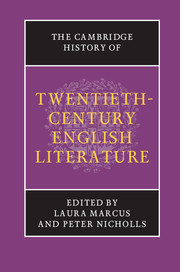Book contents
- Frontmatter
- Introduction
- PART ONE WRITING MODERNITY
- PART TWO THE EMERGING AVANT-GARDE
- PART THREE MODERNISM AND ITS AFTERMATH, 1918–1945
- PART FOUR POST-WAR CULTURES, 1945–1970
- PART FIVE TOWARDS THE MILLENNIUM, 1970–2000
- 32 The Seventies and the cult of culture
- 33 Feminism and writing: the politics of culture
- 34 The half-lives of literary fictions: genre fictions in the late twentieth century
- 35 Theatre and politics
- 36 Irish literature: tradition and modernity
- 37 Scottish literature: Second Renaissance
- 38 Towards devolution: new Welsh writing
- 39 British–Jewish Writing and the turn towards diaspora
- 40 Fiction and postmodernity
- 41 Postcolonial fictions
- 42 Writing lives
- 43 Poetry after 1970
- 44 Ending the century: literature and digital technology
- Bibliography
- Index
- References
37 - Scottish literature: Second Renaissance
from PART FIVE - TOWARDS THE MILLENNIUM, 1970–2000
Published online by Cambridge University Press: 28 March 2008
- Frontmatter
- Introduction
- PART ONE WRITING MODERNITY
- PART TWO THE EMERGING AVANT-GARDE
- PART THREE MODERNISM AND ITS AFTERMATH, 1918–1945
- PART FOUR POST-WAR CULTURES, 1945–1970
- PART FIVE TOWARDS THE MILLENNIUM, 1970–2000
- 32 The Seventies and the cult of culture
- 33 Feminism and writing: the politics of culture
- 34 The half-lives of literary fictions: genre fictions in the late twentieth century
- 35 Theatre and politics
- 36 Irish literature: tradition and modernity
- 37 Scottish literature: Second Renaissance
- 38 Towards devolution: new Welsh writing
- 39 British–Jewish Writing and the turn towards diaspora
- 40 Fiction and postmodernity
- 41 Postcolonial fictions
- 42 Writing lives
- 43 Poetry after 1970
- 44 Ending the century: literature and digital technology
- Bibliography
- Index
- References
Summary
Robert Crawford has argued that ‘Scotland needs not the pursuit of some elusive echt-Scottishness, but requires many reminders of its protean and plural past, present and future.’ Indeed, in literary and cultural terms, Scotland during the last three decades of the twentieth century has increasingly found a series of ‘usable’ pasts and presents as it has divested itself of a former desire for an organic unity in national identity; one that rested on an over-wrought perception of the country’s ever fragmenting history within the context of a hopelessly marginalising British superstate. In creative literature, as elsewhere, this liberation from the aggrieved pursuit of an ideally coherent nation has resulted in a much greater inclusiveness of the various historical and cultural component parts of ‘Scottishness’ and an experimentation that can be both suitably iconoclastic and re-evaluative.
One of the most striking voices to emerge since the first publication of his work in 1968 is that of Tom Leonard who sounds a mischievously scandalising note in his poster-poem, ‘Makars’ Society’: ‘GRAN’ MEETIN’ THE NIGHT TAE DECIDE THE SPELLIN’ O’ THIS POSTER’. Leonard is one of a group of writers who have brought Glasgow and the west of Scotland to the centre of the Scottish literary stage for the first time in any critical mass. Leonard, Alasdair Gray, James Kelman, Liz Lochhead and others formed enduring personal associations in creative writing seminars run by Philip Hobsbaum, the English poet and academic, who was already well known as a supporter of ‘regional’ writing in Ulster when he arrived to work at the University of Glasgow.
- Type
- Chapter
- Information
- The Cambridge History of Twentieth-Century English Literature , pp. 668 - 684Publisher: Cambridge University PressPrint publication year: 2005

